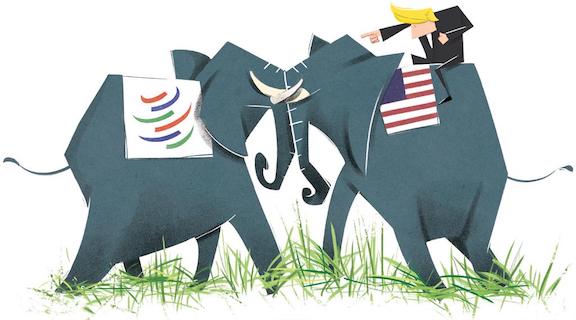The World Trade Organization published its first ruling on national security Friday, setting a legal precedent that will lead to a likely clash with the U.S. over tariffs.
The landmark ruling, on a dispute between Russia and Ukraine, both affirms the rights of nations to impose trade restrictions on national-security grounds and asserts the WTO’s authority to determine whether a security threat warrants such restrictive measures. The Trump administration has said the WTO doesn’t have the power to rule on these matters.

“Issues that are sensitive enough to bring up national security concerns should be treated politically and not technically at the dispute settlement mechanism of the WTO,” Azevedo said in an April 4 interview in Mexico City. “But they are bringing the cases and we don’t have an option.”
Steel, Aluminum Tariffs
While the ruling dealt with a dispute between Russia and Ukraine, it has important ramifications for a series of separate WTO cases related to Trump’s steel and aluminum tariffs, which use a controversial interpretation of a cold-war era U.S. national security law.
The WTO allows a country to take “any action which it considers necessary for the protection of its essential security interests.” That has become a favorite justification for Trump, who is now threatening tariffs on car imports using the same national-security rationale.
Friday’s decision asserted that Russia didn’t violate international trade rules when it imposed restrictions on Ukrainian goods in transit through Russian territory to Kazakhstan and Kyrgyzstan. The ruling said in general every member can define their essential security interests but that the WTO may review whether a country’s national-security claim was not made in good faith.
The WTO panel said “there has existed a situation in Russia’s relations with Ukraine that constitutes an emergency in international relations,” and that “Russia has met the requirements for invoking” the national-security clause of international trade rules.
Ukraine and Russia will have 60 days to decide whether to appeal any of the panel’s findings.
Russia, which is challenging the U.S. tariffs on foreign steel and aluminum, welcomed the decision. “The ruling makes our arguments in the dispute with the U.S. more weighty,” Economy Minister Maxim Oreshkin said in a statement. “Our victory in the WTO thus has systemic importance for the organization and should become part of the planned reform.”
Political Confrontation
The dispute could pose an existential threat for the WTO, which has long avoided a politically fraught confrontation over national-security disputes for fear of triggering tit-for-tat retaliation.
Backing Russia’s right to implement some restrictions on Ukraine could entice countries to implement protectionist trade measures using the security justification. Indeed, nations are increasingly invoking the once-taboo provision to avoid WTO oversight of regional conflicts like Saudi Arabia’s economic dispute with Qatar and India’s conflict with Pakistan.
The ruling is likely to vex the Trump administration, which argues that the WTO cannot decide whether measures are necessary to protect a country’s security interests because it would infringe on that country’s sovereign rights.
Canada, the European Union, Mexico and a half-dozen other U.S. trade partners have asked the WTO to determine if Trump’s metal tariffs are actually necessary to protect America’s national security.










